Photo: Residents at the Planning Board meeting Tuesday night.
The Board of Selectmen’s Room in Belmont’s Town Hall was stuffed to the rafters with residents Tuesday night, May 2 as the Planning Board reopened the public hearing to hear from both sides of a now controversial development planned at a private school on Belmont Hill.
By the end of the 90-minute meeting, it was apparent the Planning Board’s next step rests on a legal interpretation by Belmont Town Counsel George Hall whether the Belmont Day School could be required to undertake a pair of potentially time-consuming and expensive independent reviews of the impact the proposed develop could have on local traffic levels and stormwater.
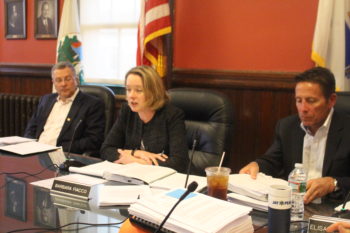
The Belmont Planning Board.
It is an action the Day School’s legal representative considers mute due to the state General Law 40a (3) (2) – known as the Dover Amendment – protecting education and religious entities from land use regulations; the same legal standard used more than two decades ago to build another contentious project in town, the Boston LDS Temple.
“We need to bear in mind the Dover Amendment, which means in situations like this, where there is a proposal to build a structure for an educational purpose, we are limited to imposing reasonable regulations,” said Acting Planning Board Chair Barbara Fiacco of the construction of an indoor gym/classroom space and a new road/driveway at the Day School, a private kindergarten/elementary/middle school located off Concord Avenue on Day School Lane.
The Day School has reported it would want construction on the project to begin in the fall of 2017 with a September 2018 opening.
Speaking of the Day School, Kelly Durfee Cardoza from Avalon Consulting opened the meeting telling the board the school had met with abutters and carefully attempted to address some issues immediately such as moving a dumpster away from the border with the town’s cemetery.
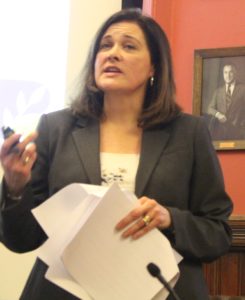
Kelly Durfee Cardoza, Avalon Consulting
Cardoza also told the board the school would introduce a Transportation Demand Plan which when implemented would use a series of actions such as car pooling, traffic monitoring, establishing a commuter ride system and stagger arrival and departures to reduce the level of traffic to and from the school.
The two camps opposing the Day School’s plans – reportedly the two groups have no intention of joining their efforts due to longstanding animosity among certain neighbors – believe the construction of what is being dubbed “The Barn” will increase enrollment and subsequently bring additional vehicle traffic onto the section of Concord Avenue which residents note is jammed during the morning and evening rush to work and home.
Opponents also believe a new access road/driveway into the school off Concord Avenue will lead to unsafe driving conditions, possible drainage issues and disturb those visiting the town’s Highland Cemetery.
One group has hired an independent traffic consultant, Robert Vanasse of Vanasse & Associates, Inc. who told the board the Day School’s traffic study is insufficient in several areas of concern, including not mentioning the weekday half-mile queue of cars on Concord Avenue in the morning and afternoon, the causes of accidents in the vicinity of the school, and the high rate of speed along the roadway.
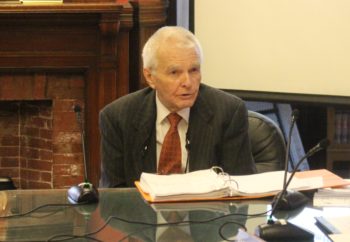
Robert Vanasse, Vanasse & Associates
Vanasse said while he was not opposed to having the new roadway to the school to be used for “emergencies only,” adding a new intersection on busy Concord Avenue.
Also, the town’s Cemetery Commission has written to the Planning Board on its concerns about stormwater, traffic and the loss of what many are calling “the decorum” of those who purchased plots in the graveyard as traffic on the new roadway will be mere feet from the site.
Stormwater management was also questioned whether the current infrastructure would be able to support a new road which would direct rainwater and snow runoff.
But standing in the opponent’s attempts to restrict the effects of the new construction is how wide the Dover Amendment protects the Day School’s rights.
“The board should think carefully about whether they have the authority to request a peer review for the traffic study both under your site plan review bylaw and under the Dover Amendment” as both only allows for a review of “internal” traffic – within the school property – and not offsite matters, said Robinson & Cole’s Katherine Bailey.
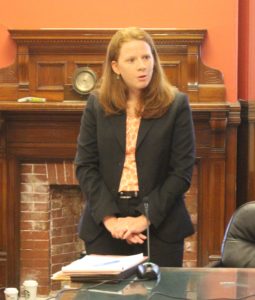
Robinson & Cole’s Katherine Bailey
After a limited number of residents spoke mostly in favor of the school’s expansion, the Planning Board brought their own set of questions, including from the Board’s Raffi Manjikian who quired whether the school had an operation maintenance plan to ensure the previous material under the roadway will not fail after a limited number of years.
Many of the questions posed by the Planning Board were seeking assurances from the Day School it would have plans in place and programs ready to meet all contingency issues regarding the main concerns of traffic, stormwater and being neighborly to the town’s cemetery.
While the issue of requiring a third party peer review remained only conjecture at the meeting, Board member Joseph DeStefano asked the Day School to voluntarily submit to the second audit “as being part of this community” rather than seek legal advice from the town counsel.
When Fiacco said she wanted to hear from Hall on the board’s right to require the review, Bailey asked, “in the interest of timeliness” if the Day School could join in that discussion outside the public meeting.
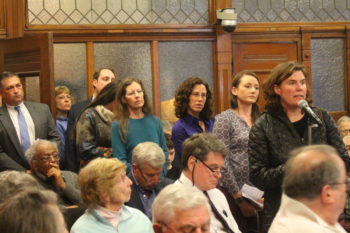
If Hall decided a peer review is warranted, Bailey asked if the review could be started before the next public meeting “so to keep the process moving.” Fiacco tentatively agreed to the request if a Planning Board representative is present.
Since the Planning Board determined at the beginning of the meeting it would not make a final decision; the next public meeting will be reopened on Tuesday, May 23.








Leave a Review or Comment